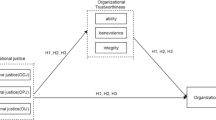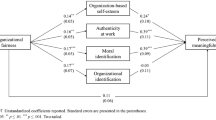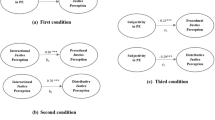Abstract
An organizational field study examined the extent to which fair treatment influences organizational commitment was a function of employees’ levels of social self-esteem. Following recent research indicating that self-esteem acts as a moderator of procedural fairness effects, we suggested that to examine the relational assumption that self and procedures are related, one should assess the social dimension of self-esteem. In line with predictions, the results indeed showed that fair treatment (assessed by an interactional justice scale) positively influences affective commitment, but only when employees have low social self-esteem. These findings are discussed in light of research on relational models of justice and sociometer theory.
Similar content being viewed by others
References
Amnesty International (1992). Au delà de l’Etat. Le droit international et la défense des Droits de l’Homme, Amnesty International, Paris.
Bechlivanou, G., Delmas-Marty, M., Doise, W., Duchesne, S., Gonzalez, L., and Lenoir, R. (1990). Discours juridique et discours ordinaire. La perception des droits de l’homme dans la société contemporaine. Archives de Politique Criminelle 12: 145–166.
Billig, M. (1989). Ideological Dilemmas: A Social Psychology of Everyday Dilemmas, Sage, London.
Clémence, A., and Doise, W. (1995). La représentation sociale de la justice: Une approche des droits dans la pensée ordinaire. L’Année Sociologique 45: 371–400.
Clémence, A., Egloff, M., Gardiol, N., and Gobet, P. (1994). Solidarités Sociales en Suisse, Réalités sociales, Lausanne.
Crandall, C. S., and Beasley, R. K. (2001). A perceptual theory of legitimacy. Politics, prejudice, social institutions, and moral value. In Jost, J. T., and Major, B. (eds.), The Psychology of Legitimacy. Emerging Perspectives on Ideology, Justice, and Intergroup Relations, Cambridge University Press, Cambridge, pp. 77–102.
Darley, J. (2002). Just punishments: Research on retributional justice. In Ross, M., and Miller, D. T. (eds.), The Justice Motive in Everyday Life, Cambridge University Press, Cambridge, pp. 314–333.
Doise, W. (2002). Human Rights as Social representations, Routledge, London.
Emler, N. (2003). Morality and political orientations: An analysis of their relationship. In Stroebe, W., and Hewstone, M. (eds.), European Review of Social Psychology, Vol. 13, Chichester, Wiley, U.K., pp. 259–291.
Feather, N. T. (1999). Values, Achievement, and Justice: Studies in the Psychology of Deservingness, Kluwer Academic, New York.
Feather, N. T. (2003). Distinguishing between deservingness and entitlement: Earned outcomes versus lawful outcomes, Eur. J. Soc. Psychol. 33: 367–385.
Gilens, M. (1999). Why Americans Hate Welfare: Race, Media and the Politics of Antipoverty Policy, University of Chicago Press, Chicago.
Greenwald, A. G. (1980). The totalitarian ego: Fabrication and revision of personal history. Am. Psychol. 35: 603–618.
Hafer, C. (2002). Why we reject innocent victims. In Ross, M., and Miller, D. T. (eds.), The justice motive in everyday life, Cambridge University Press, Cambridge, pp. 109–126.
Jost, J. T., and Banaji, M. R. (1994). The role of stereotyping in system-justification and the production of false consciousness. Br. J. Soc. Psychol. 33: 1–27.
Lerner, M. J. (1977). The justice motive: Some hypotheses as to its origins and its forms. J. Pers. 45: 1–52.
Lerner, M. J., and Goldberg, J. H. (1999). When do decent people blame victims: The differing effects of the explicit-rational and implicit-experiential cognitive systems. In Chaiken, S., and Trope, Y. (eds.), Dual process theories in social psychology, Guilford, New York, pp. 627–640.
Miller, D. T. (2001). Disrespect and the experience of injustice, Ann. Rev. Psychol. 52: 527–553.
Moghaddam, F. M., and Vuksanovic, V. (1990). Attitudes and behavior toward human rights across different contexts: The role of right-wing authoritarianism, political ideology, and religiosity. Int. J. Psychol. 25: 455–474.
Mussweiler, T., and Strack, F. (1999). Comparing is believing: A selective accessibility model of judgmental anchoring. In Stroebe, W., and Hewstone, M. (eds.), European Review of Social Psychology, Vol. 10, Chichester, Wiley, U.K., pp. 135–167.
Nelson, T. E., and Kinder, D. R. (1996). Issue frames and group-centrism in American public opinion. J. Pol., 58: 1055–1078.
Nisbett, R. E., and Ross, L. (1980). Human Inference: Strategies and Shortcomings of Social Judgment, Prentice Hall, Englewood Cliffs, New Jersey.
Reinert, M. (1986). Un logiciel d’analyse lexicale (ALCESTE). Cahiers de l’Analyse des Données 4: 471–484.
Sears, D. O. (1993). Symbolic politics: A socio-psychological theory. In Iyengar, S., and McGuire, W. J. (eds.), Explorations in Political Psychology, Durham, Duke University Press, North Carolina, pp. 113–149.
Skitka, L. J. (2002). Do the means always justify the ends or do the ends sometimes justify the means? A value protection model of justice, Pers. Soc. Psychol. Bull. 28: 588–597.
Skitka, L. J., and Houston, D. A. (2002). When due process is of no consequence: Moral mandates and presumed defendant guilt or innocence. Soc. Justice Res. 14: 305–326.
Staerklé, C., Roux, P., Delay, C., Gianettoni, L., and Perrin, C. (2003). Consensus and conflict in lay conceptions of citizenship: Why people reject or support maternity policies in Switzerland. Psychologica Belgica (Special issue: Social Identity and Citizenship) 32: 9–32.
Van den Bos, K. (2003). On the subjective quality of social justice: The role of affect as information in the psychology of justice judgments. J. Pers. Soc. Psychol. 85: 482–498.
Van den Bos, K., and Lind, E. A. (2002). Uncertainty management by means of fairness judgments. In Zanna, M. P. (ed.), Advances in Experimental Social Psychology, Vol. 34, San Diego, Academic Press, California, pp. 1–60.
Author information
Authors and Affiliations
Corresponding author
Rights and permissions
About this article
Cite this article
De Cremer, D., van Knippenberg, D., van Dijke, M. et al. How Self-Relevant is Fair Treatment? Social Self-Esteem Moderates Interactional Justice Effects. Soc Just Res 17, 407–419 (2004). https://doi.org/10.1007/s11211-004-2059-x
Issue Date:
DOI: https://doi.org/10.1007/s11211-004-2059-x




